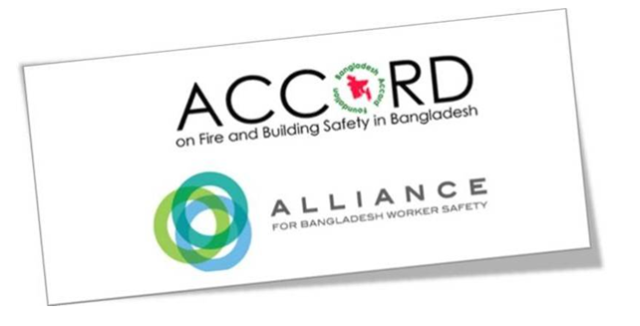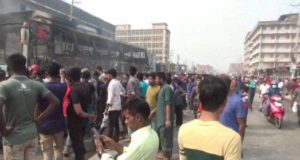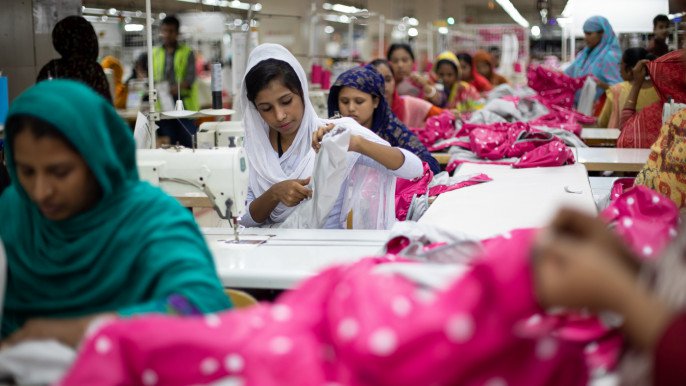Published in New Age on February 25, 2018

The government, pressed by the expiry of two global buyers’ platforms in July, is planning to strengthen with its own fund its remediation coordination cell, which will take over the responsibility of the post-remediation oversight of readymade garment factories, as the ILO fund is yet to be available.
In May, last year, the government, in association with International Labour Organisation with funding from Canada, the Netherlands and the United Kingdom, launched remediation coordination cell to manage the remediation process for the country’s garment factories.
In February, 2016, the labour ministry had agreed in principle that to extend the ILO’s RMG programme in Bangladesh up to 2020 from 2017 as the ILO proposed to extend the programme saying that the organisation would arrange additional fund to support the remediation process and build the longer-term capacity of the regulatory bodies to take on full responsibility of inspections.
Although the government repeatedly assured international community that the RCC would be responsible for ensuring factory safety once the timeframe of two platforms of global buyers — Accord on Fire and Building Safety in Bangladesh and Alliance for Bangladesh Worker Safety — would end, global stakeholders were not convinced with the progress of the initiative.
‘We are planning to strengthen the RCC with our own fund as the funding from ILO is being delayed due to procedural complexities,’ state minister for labour Mujibul Haque told New Age on Thursday.
He said that the labour ministry already discussed the issue with finance ministry and a project proposal for strengthening RCC would be placed to the finance ministry very soon.
Mujibul hoped that the labour ministry would be able to appoint necessary workforce including engineers to the RCC within three months and the platform would be capable to take over the responsibility from Accord and Alliance in due time.
The Accord and Alliance came into effect in May and June 2013, respectively in the aftermath of the Rana Plaza building collapse of April 2013, in which 1,134 workers were killed.
As per the announcement, the timeframe of the two buyers’ platforms would end in May and June this year and both the platform would get six months transitional period for handing over their responsibility to a national competent body.
Last year, The Accord announced that the initiative would continue its work for three more years under the ‘2018 Accord’.
Bangladesh government and garment factory owners strongly opposed the unilateral decision of Accord saying that the initiative would have to leave Bangladesh after its tenure and the RCC would bear the responsibility of safety monitoring.
Following about one year of the establishment of RCC, the government is yet to recruit necessary workforce including engineers who will conduct the post-remediation monitoring in the readymade garment sector.
According to the labour ministry officials, ILO was supposed to arrange $7 million of fund for strengthening RCC under the second phase of its RMG programme in Bangladesh but the extended project (2017-2020) is yet to be approved.
‘If we wait for ILO, it will be late. If we want to ensure a credible national body for taking over the safety responsibility from Accord and Alliance, we will have to start employment of engineers and other workforce to the RCC wit in the short time,’ one of the ministry officials said.
Another official of the ministry, however, said that ILO would get the approval of its extended RMG project within the short time and the organisation was planning to appoint a private firm for hiring engineers for the RCC.
Global labour rights groups on Thursday once again urged global brands to sign Accord 2018 saying that there was still no credible alternative to the Accord to protect worker safety in Bangladesh.
Global trade union federations IndustriALL and UNI global union said that as long as the Bangladeshi government was not ready to assume this responsibility, the Accord should continue to provide the training, engineering expertise and accountability structures necessary to make garment work safer.
The readymade garment factory owners, however, said that the government and the sector insiders were working jointly to ensure a competent national platform to take over the responsibility from Accord and Alliance.
‘The time frame of Accord would end in May this year but the platform would get a six-month transitional period and we will prepare our national platform by the time,’ said Md Siddiqur Rahman, president of Bangladesh Garment Manufacturers and Exporters Association.
He said that a review committee headed by the labour secretary would be formed by the next week to assess the progress of Accord and the preparation of RCC for handing over and taking over the safety monitoring responsibility in the RMG sector.
The committee would be constituted with the representatives of the government, brands, ILO and global trade union federations, the BGMEA president said.
 CPD RMG Study Stitching a better future for Bangladesh
CPD RMG Study Stitching a better future for Bangladesh



